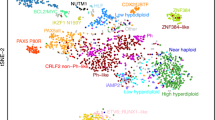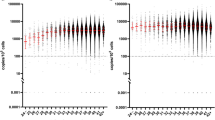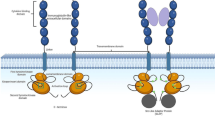Abstract—
Cytogenetic and molecular-cytogenetic rearrangements in the bone marrow cells in 251 patients with newly diagnosed myelodysplastic syndromes (MDS) and in seven patients with MDS transformed into secondary acute myeloid leukemia (AML) were compared. We have established a significant heterogeneity of karyotypes in the structure of clones in all separate MDS forms and all secondary AMLs transformed from MDS, which is the evidence of a diverse genetic composition of bone marrow cells. The evolution of clonal chromosome abnormalities was shown to be a universal mechanism for the formation of abnormal clones. The frequency of pseudo-diploid and hypodiploid clones was shown to increase depending on the structure of a given MDS form (in pseudo-diploid form from 4.5% in MDS with unilineage dysplasia (refractory anemia, RA) to 27.3 in MDS with excess blasts (RAEB 1–2); hypodiploid from 4.5% in RA to 18.2% in RAEB 1–2), which was associated with the loss of genetic material. It has been found that genetic material losses as deletions (57.9%) were more frequently detected in the RA group. Chromosome 11 was more frequently involved in structural rearrangements (31.6%).


Similar content being viewed by others
REFERENCES
Arber, D.A., Orazi, A., Hasserjian, R., et al., The 2016 revision to the World Health Organization classification of myeloid neoplasms and acute leukemia, Blood, 2016, vol. 127, no. 20, pp. 2391–2405. https://doi.org/10.1182/blood-2016-03-643544
Avada, H., Thapa, B., and Visconte, V., The genomics of myelodysplastic Syndromes: origins of disease evolution, biological pathways, and prognostic implications, Cells, 2020, vol. 9, no. 11, art. ID 2512. https://doi.org/10.3390/cells9112512
Bacher, U., Haferlach, T., Schnittger, S., et al., Investigation of 305 patients with myelodysplastic syndromes and 20q deletion for associated cytogenetic and molecular genetic lesions and their prognostic impact, Br. J. Haematol., 2014, vol. 164, no. 6, pp. 822–833. https://doi.org/10.1111/bjh.12710
Gersen, St.L., The Principles of Clinical Cytogenetics, New York: Springer-Verlag, 2013.
Gluzman, D., Sklyrenko, L., Koval, S., et al., Modern Classification and Diagnosis of Myelodysplastic Syndromes. Scientific-and-Methodical Quide, Kyiv: INTERSERVIS, 2018.
Haase, D., Stevenson, K.E., Neuberg, D., et al., TP53 mutation status divides myelodysplastic syndromes with complex karyotypes into distinct prognostic subgroups, Leukemia, 2019, vol. 33, pp. 1747–1758. https://doi.org/10.1038/s41375-018-0351-2
Karger, A.G. and Basel Greenberg, P.L., Myelodysplastic Syndromes. NCCN Evidence Blocks, 2021. https://www.nccn. org/professionals/physician_gls/pdf/mds_blocks.pdf. Cited January 15, 2021.
Komrokji, R.S., Padron, E., Ebert, B.L., et al., Deletion 5q MDS: Molecular and therapeutic implications, Best Pract. Res., Clin. Haematol., 2013, vol. 26, no. 4, pp. 365–375. https://doi.org/10.1016/j.beha.2013.10.013
Kumar, M.S., Narla, A., Nonami, A., et al., Coordinate loss of a microRNA and protein-coding gene cooperate in the pathogenesis of 5q− syndrome, Blood, vol. 118, no. 17, pp. 4666–4673. 2011. https://doi.org/10.1182/blood-2010-12-324715
Kuzmanovic, T., Patel, B.J., Sanikommu, S.R., et al., Genomics of therapy-related myeloid neoplasms, Haematologica, 2020, vol. 105, no. 3, art. ID e98. https://doi.org/10.3324/haematol.2019.219352
Lindsley, R.C. and Ebert, B.L., Molecular pathophysiology of myelodysplastic syndromes, Ann. Rev. Pathol., 2013, vol. 8, pp. 21–47. https://doi.org/10.1146/annurev-pathol-011811-132436
McGowan-Jordan, J., An International System for Human Cytogenomic Nomenclature (2020), 2021.
Ogawa, S., Genetics of MDS, Blood, 2019, vol. 133, no. 10, pp. 1049–1059. https://doi.org/10.1182/blood-2018-10-844621
Pellagatti, A. and Boultwood, J., The molecular pathogenesis of the myelodysplastic syndromes, Eur. J. Haematol., 2015, vol. 95, no. 1, pp. 3–15. https://doi.org/10.1111/ejh.12515
Sashida, G., Harada, H., Matsui, H., et al., Ezh2 loss promotes development of myelodysplastic syndrome but attenuates its predisposition to leukaemic transformation, Nat. Commun., 2014, vol. 5, art. ID 4177. https://doi.org/10.1038/ncomms5177
Saumell, S., Florensa, L., Luño, E., et al., Prognostic value of trisomy 8 as a single anomaly and the influence of additional cytogenetic aberrations in primary myelodysplastic syndromes, Br. J. Haematol., 2012, vol. 159, no. 3, pp. 311–321. https://doi.org/10.1111/bjh.12035
Schanz, J., Tüchler, H., Solé, F., et al., New comprehensive cytogenetic scoring system for primary myelodysplastic syndromes (MDS) and oligoblastic acute myeloid leukemia after MDS derived from an international database merge, J. Clin. Oncol., 2012, vol. 30, no. 8, pp. 820–929. https://doi.org/10.1200/JCO.2011.35.6394
Shiseki, M., Ishii, M., Okada, M., et al., Expression analysis of genes located within the common deleted region of del(20q) in patients with myelodysplastic syndromes, Leuk. Res., 2019, vol. 84, art. ID 106175. https://doi.org/10.1016/j.leukres.2019.106175
Stoddart, A., Fernald, A.A., Wang, J., et al., Haploinsufficiency of del(5q) genes, Egr1 and Apc, cooperate with Tp53 loss to induce acute myeloid leukemia in mice, Blood, 2014, vol. 123, no. 7, pp. 1069–1078. https://doi.org/10.1182/blood-2013-07-517953
Svobodova, K., Zemanova, Z., Lhotska, H., et al., Copy number neutral loss of heterozygosity at 17p and homozygous mutations of TP53 are associated with complex chromosomal aberrations in patients newly diagnosed with myelodysplastic syndromes, Leuk. Res., 2016, vol. 42, no. 1, pp. 7–12. https://doi.org/10.1016/j.leukres.2016.01.009
Veryaskina, Y.A., Titov, S.E., Kovynev, I.B., et al., Prognostic markers of myelodysplastic syndromes, Medicina (Kaunas), 2020, vol. 56, no. 8, art. ID 376. https://doi.org/10.3390/medicina56080376
Xu, F., Liu, L., Chang, C.K., et al., Genomic loss of EZH2 leads to epigenetic modifications and overexpression of the HOX gene clusters in myelodysplastic syndrome, Oncotarget, 2016, vol. 7, no. 7, pp. 8119–8130. https://doi.org/10.18632/oncotarget.6992
Funding
The study was performed within the national project To Determine the Prognostic Significance of the Intercellular Interaction Mediators and the Clusters of Substrate Cells for Stratifying and Optimizing the Treatment of Myelodysplastic/Myeloproliferative Neoplasms. Implementation term: 2019–2021.
Author information
Authors and Affiliations
Corresponding authors
Ethics declarations
Conflict of interest. The authors declare that they have no conflicts of interest.
Statement of compliance with standards of research involving humans as subjects. The conformity of studies with bioethics standards was confirmed by the Committee for Ethics of the Institute of Hematology and Transfusiology of the National Academy of Medical Sciences of Ukraine (Kyiv, Ukraine). All patients gave consent to their participation in the study.
About this article
Cite this article
Andreieva, S.V., Korets, K.V., Skorohod, I.M. et al. Comparative Characteristics of Cytogenetic Abnormalities in Different Types of Myelodysplastic Syndromes. Cytol. Genet. 56, 423–430 (2022). https://doi.org/10.3103/S0095452722050024
Received:
Revised:
Accepted:
Published:
Issue Date:
DOI: https://doi.org/10.3103/S0095452722050024




